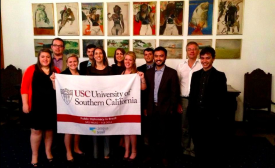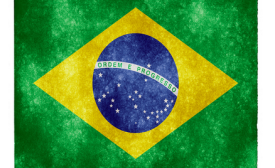brazil
When it comes to matters of economic disparity and sense of fair play, Brazil and Mexico score worse than countries in Africa. A survey conducted via mobile phones of people in Nigeria, South Africa, Kenya, Brazil and Mexico by Boston-based Jana shows people from both Latin American countries are more negative on issues related to inequality and taxation.
One often hears that Brazil’s economy is stuck in the “middle-income trap.” Since the debt crisis of the 1980’s, Brazil has failed to revive the structural transformation and per capita income growth that had characterized the previous three decades. But, with the right mix of policies, it could finally change its fortunes.

In early February, 7 USC Master of Public Diplomacy students embarked for São Paulo, Brazil. We arrived with just a day to get acclimated to the city before our meetings began on Monday. As students of diplomacy, the logical choice for a research trip to Brazil might be Brasilia. As the capital, it hosts the country's diplomatic corps and would certainly make a worthy case study of how diplomacy works in Brazil. While traditional diplomacy will always be worth pursuing, we are not going to Brazil to study it.
Each year the second year students in the USC Master of Public Diplomacy program select a location abroad to conduct new research that can further the study and practice of public diplomacy. This year, the Class of 2014 selected Sao Paulo, Brazil for its unique position in world politics. Brazil is currently transitioning from a regional and hemispheric power to a global one.
A Cuban doctor working in Brazil has sought political asylum in the office of a conservative party complaining that Cuba's communist government takes too big a slice of her pay, a party official said on Wednesday. Ramona Rodriguez, 51, entered the office of the center-right Democratas party leadership in the lower chamber of Brazil's Congress on Tuesday afternoon and slept the night on a sofa, the official said.
The past two decades have been all about the BRICS: a group of five countries (Brazil, Russia, India, China, and South Africa) that soared to economic superstardom and gradually won geopolitical influence. But now, with their economies slowing down, those days seem to be over. What’s more, by some measures, the BRICS have squandered their years of plenty.

Each year the second year students in the USC Master of Public Diplomacy program select a location abroad to conduct new research that can further the study and practice of public diplomacy. This year, the Class of 2014 selected Sao Paulo, Brazil for its unique position in world politics. Brazil is currently transitioning from a regional and hemispheric power to a global one. The country will be on display during the 2014 FIFA World Cup and the 2016 Summer Olympics in Rio de Janeiro, and MPD students want to gain a better understanding of Brazilian public diplomacy practices.
On Friday the Popular Committees of the World Cup published a list of their 8 demands for the federal and state governments in Brazil. This is attracting a good amount of interest in Brazil and has been shared on the blogs of some of the most popular sports journalists in Brazil. So far, I haven’t seen an English language version of these demands so I’ve translated them below.







